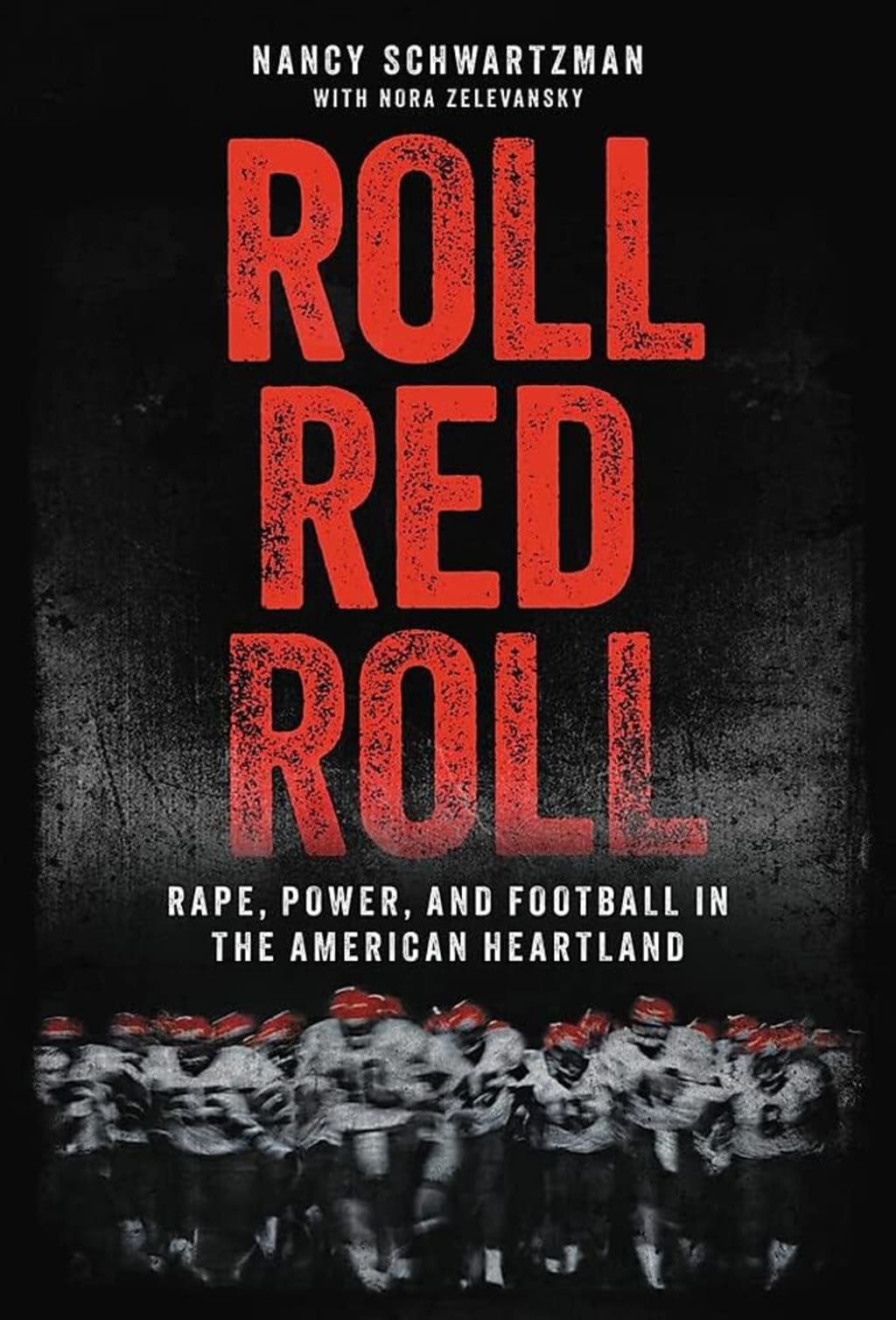"Roll Red Roll: Rape, Power, and Football in the American Heartland" by Nancy Schwartzman & Nora Zelevansky
Book club discussion prompts

In football-obsessed Steubenville, Ohio, on a summer night in 2012, an incapacitated sixteen-year-old girl was repeatedly assaulted by members of the “Big Red” high school football team. They took turns documenting the crime and sharing on Facebook, Twitter, and YouTube. The victim, Jane Doe, learned the details via social media at a time when teens didn’t yet understand the lasting trail of their digital breadcrumbs. Crime blogger Alexandria Goddard, along with hacker collective Anonymous, exposed the photos, Tweets, and videos, making this the first rape case ever to go viral and catapulting Steubenville onto the national stage. Filmmaker Nancy Schwartzman spent four years embedded in the town, documenting the case and its reverberations. Ten years after the assault, Roll Red Roll is the culmination of that research, weaving in new interviews and personal reflections to take readers beyond Steubenville to examine rape culture in everything from sports to teen dynamics. Roll Red Roll explores the factors that normalize sexual assault in our communities. Through interviews with sportswriter David Zirin, victim’s rights attorney Gloria Allred and more, Schwartzman untangles the societal norms in which we too often sacrifice our daughters to protect our sons. With the Steubenville case as a flashpoint that helped spark the #MeToo movement, a decade later, Roll Red Roll focuses on the perpetrators and asks, can our society truly change?
About the Authors:
Nancy Schwartzman
Nancy Schwartzman is an American filmmaker, activist, and advocate who is known for her work in the field of sexual assault prevention and awareness. She has directed and produced several documentary films, with a strong focus on issues related to sexual violence, consent, and gender equality.
"The Line" (2010): One of her most notable works is the documentary "The Line," which explores the complex issue of consent and sexual assault. The film features interviews with survivors, experts, and perpetrators and examines the blurred lines between consent and coercion.
Tech 4 Good and Activism: Nancy Schwartzman is also known for her work in using technology for social good. She has been an advocate for using technology to prevent sexual violence and educate individuals about consent. She founded the Tech 4 Good organization, which promotes innovative solutions for addressing issues related to sexual assault.
Impact and Advocacy: Schwartzman has been a vocal advocate for sexual assault survivors and has worked to create spaces for dialogue and education surrounding consent and healthy relationships. Her work has contributed to increased awareness and understanding of these issues.
Continued Filmmaking and Activism: In addition to "The Line," Schwartzman has continued to work on projects related to sexual violence prevention and education. She has also been involved in public speaking engagements, workshops, and educational initiatives aimed at promoting consent culture.
Nora Zelevansky
Nora Zelevansky is an American author and journalist known for her work in writing, particularly in the areas of fiction and lifestyle.
Writing Career: Nora Zelevansky is known for her work as an author and journalist. She has written both fiction and non-fiction, and her writing often explores themes related to relationships, identity, and contemporary urban life.
"Semiautomatic" (2012): One of her notable works is the novel "Semiautomatic," a humorous and insightful novel that delves into the lives and relationships of a group of young professionals in Los Angeles. The book received positive reviews for its wit and character-driven storytelling.
Lifestyle Writing: In addition to her fiction work, Nora Zelevansky has contributed to various publications and websites, writing on topics related to lifestyle, fashion, travel, and culture.
Journalism and Essays: Zelevansky has written essays and articles for publications like The New York Times, Town & Country, and Vogue, covering a range of subjects from personal experiences to societal and cultural observations.
Crime/Killer: In football-obsessed Steubenville, Ohio, on a summer night in 2012, an incapacitated sixteen-year-old girl was repeatedly assaulted by members of the “Big Red” high school football team. They took turns documenting the crime and sharing on Facebook, Twitter, and YouTube. The victim, Jane Doe, learned the details via social media at a time when teens didn’t yet understand the lasting trail of their digital breadcrumbs. Crime blogger Alexandria Goddard, along with hacker collective Anonymous, exposed the photos, Tweets, and videos, making this the first rape case ever to go viral and catapulting Steubenville onto the national stage.
Discussion Questions:
- How did the book portray the Steubenville sexual assault case? What were the key events and individuals involved?
- What were your initial thoughts and feelings when you read "Roll Red Roll"? How did the book make you feel about the subject matter?
- "Roll Red Roll" highlights the role of social media in the case. How did social media affect both the incident and the subsequent investigation? Do you think the outcome would have been different without social media?
- The book touches on the concept of bystander intervention. In what ways did bystanders contribute to the assault, and how did they react afterward? What are your thoughts on the bystanders' actions and inactions?
- How did the community of Steubenville react to the case? What role did community attitudes and expectations play in the events and their aftermath?
- The book interviews individuals from Steubenville, including some who were supportive of the perpetrators. What do you think motivated this support, and how does it reflect societal attitudes toward sexual assault?
- What impact do you think "Roll Red Roll" had on raising awareness about consent, sexual assault, and rape culture?
- The book focuses on the experiences of the survivor and her family. How do you think they handled the situation, and what were the challenges they faced?
- What were the legal and ethical implications of the case? Were the perpetrators held accountable, and was justice served?
- In the book, several people are held accountable, including the perpetrators, but also those who documented and shared the assault. What are your thoughts on assigning responsibility in such cases?
- "Roll Red Roll" is part of a larger conversation about the #MeToo movement and sexual assault awareness. How do you see this documentary fitting into the broader discussion about sexual violence and consent?
- What steps can communities and individuals take to prevent sexual assault, promote consent culture, and support survivors?
- Have you seen the documentary “Roll Red Roll”? What did you think? How does it relate or differ from the book’s retelling?
About the Creator
Kristen Barenthaler
Curious adventurer. Crazed reader. Archery fanatic. Amateur author. Librarian.
Instagram: @kristenbarenthaler
Facebook: @kbarenthaler
GoodReads: https://www.goodreads.com/author/show/15101108.Kristen_Barenthaler






Comments
There are no comments for this story
Be the first to respond and start the conversation.